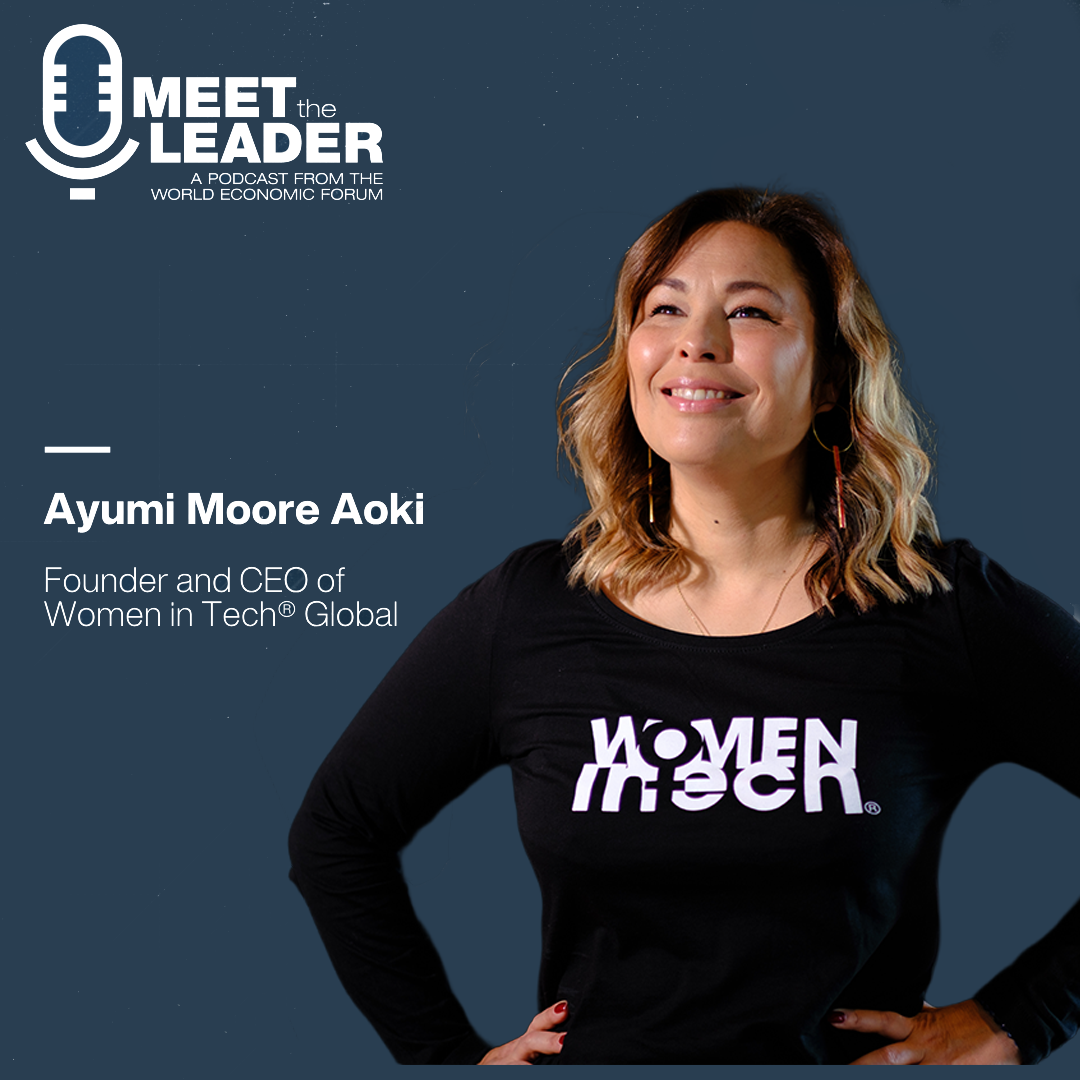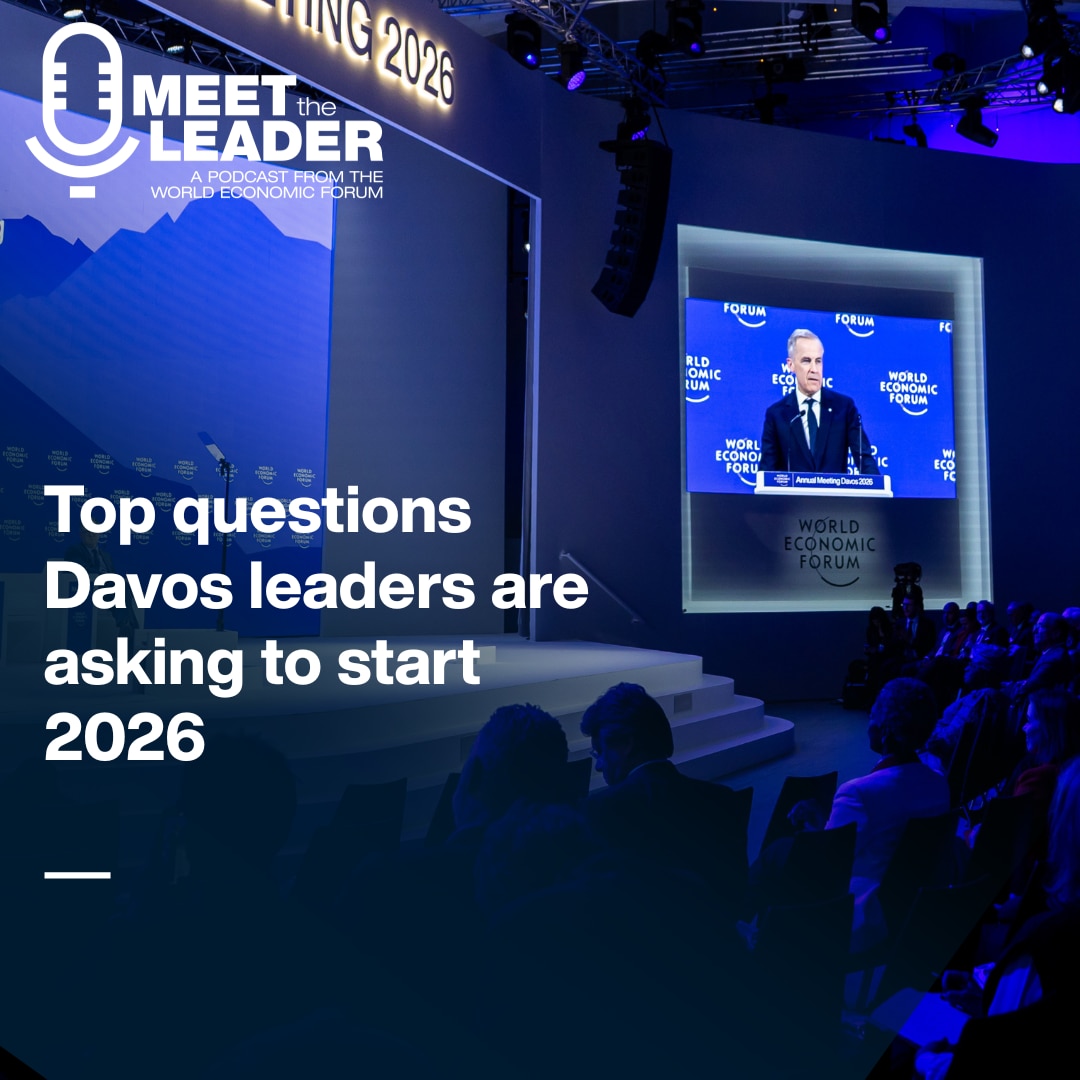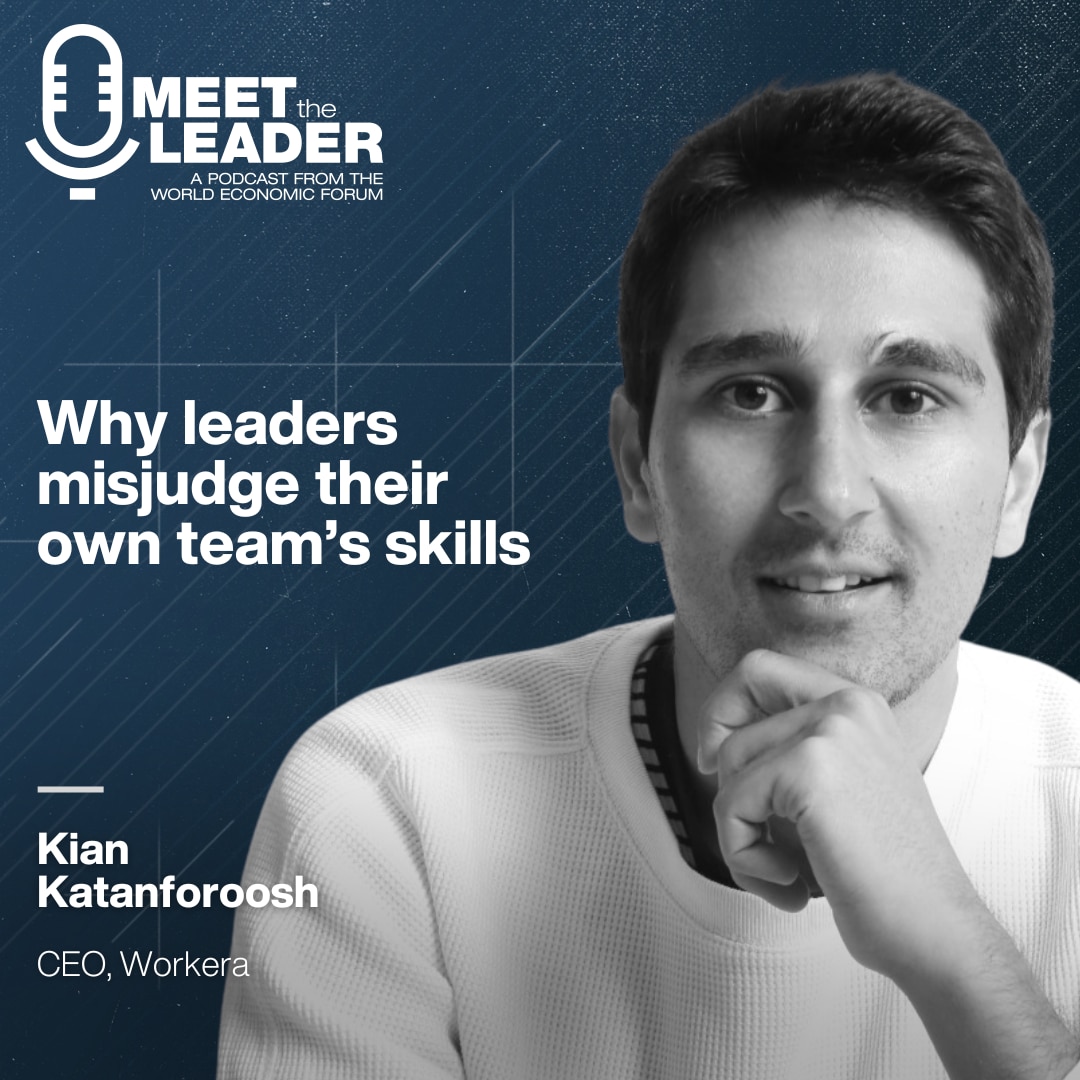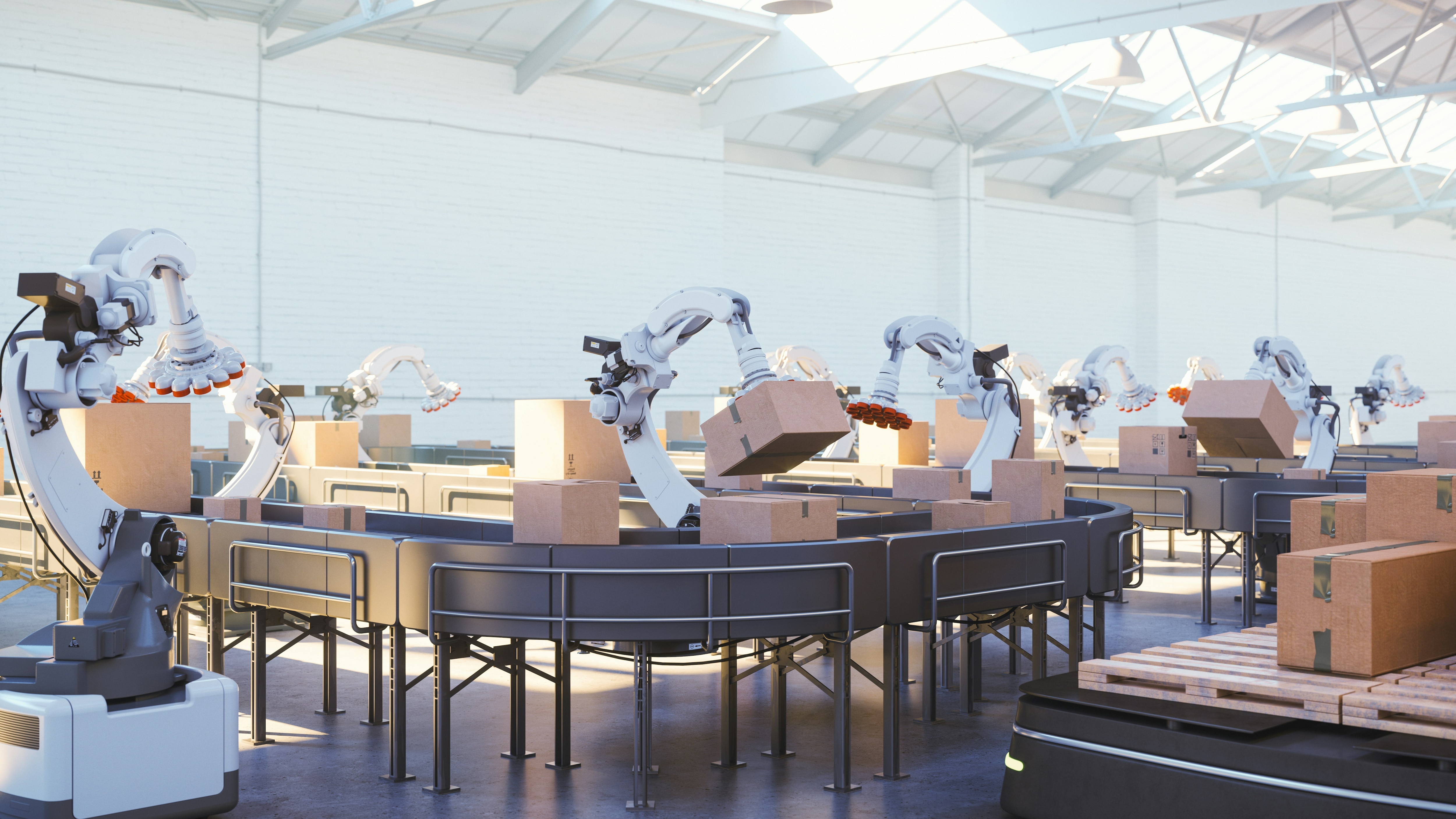This simple question helped Amazon teams get future ready: AWS AI and data chief
Podcast transcript
Linda Lacina, Meet The Leader Welcome to Meet the Leader, the podcast where top leaders share how they are tackling the world's toughest challenges.
Today we talk to Swami Sivasubramanian, the VP of Data and AI at AWS. He'll talk about what's needed for reskilling when it comes to AI and machine learning and what managers and workers must do now to get prepared now.
Subscribe to Meet the Leader on Apple, Spotify and wherever you get your favourite podcasts. And don't forget to rate and review us. I'm Linda Lacina from the World Economic Forum and this is Meet the Leader.
Swami Sivasubramanian, AWS It's super important that we make these technologies more and more accessible in a big way for the broader workforce of tomorrow, because AI and generative AI is the future.
Linda Lacina, Meet The Leader Technology is changing at a rapid clip and jobs are changing with it. Our World Economic Forum Future of Jobs report predicted that 23% of global jobs will change in just the next five years.
And while some jobs will be eliminated, but technology will make room for new jobs that haven't even been invented yet.
And other existing jobs, they'll be augmented by new technologies helping you or me do what only we can do best -- just better.
Swami Sivasubramanian understands this well. He’s the VP of Data and AI at Amazon Web Services. He’ll talk to us about what workers and managers should prioritize when it comes to getting AI ready and key free programs the company is making available to democratize access to new tech regardless of people's roles, age or even their ability to code.
He'll also talk about his own background growing up in India. He didn't have his own computer and his start at Amazon nearly 20 years ago as a mere intern. He'll share how those experiences shaped him as a leader and technologist, the questions anyone can ask to transform their teams and their future products, and how anyone can benefit from embracing new technologies.
Swaminathan Sivasubramanian, AWS Amazon has been building AI and ML technology for more than 25 years. And one thing is clear to see AI is going to be the most transformative technology of our generation. And I am really heartened by the energy and the curiosity by generative AI that I see now in the mainstream. Because generative AI has captured our imaginations for its ability to create images and videos or write stories or even generate code. And the biggest opportunity with generative AI is it can transform every aspect of how we do our business. And it's a priority for our customers.
AI will transform business and it's going to be integral to how leaders are thinking about this space.
”So that is where I'm spending a lot of time on how do you actually use data and generative AI to rethink every aspect of business and how do you enable the workforce and future builders and leaders to be able to be ready when generative AI is going more and more mainstream.
Linda Lacina, Meet The Leader Amazon has released some new data about the future of work. Can you tell us a little bit about this research and sort of what surprised you about it?
Swaminathan Sivasubramanian, AWS Yeah, if you see Amazon, it's a very data-driven company, so one of the first things we actually did was to kind of get a sense on how do businesses think about AI and how do they think about skilling. And our research -- the data confirms that AI will transform business and it's going to be integral to how leaders are thinking about this space.

Businesses are using AI and expect to lean further into this technology. For instance, 73% of our employers think hiring AI talent is going to be a top priority for them, but they can't find enough workers with the AI talent. And then the skills gap increases more and more because up to 93% of these businesses really want to deploy AI solutions in the next five years. So that means this need for a skilled technical workforce is going to further increase.

And the demand is creating opportunity for workers. When you think about it, employers expect their workers to earn up to 47% more in salaries as they upskill in AI and that is for technical roles. But equally we are finding similar such opportunity in marketing, or finance or or HR as well. So this basically reinforces how integral AI is going to be when it comes to the way work gets done across an organisation.

Linda Lacina, Meet The Leader When we talk about this, what do people sort of misunderstand when it comes to reskilling for AI or machine learning? What are they they need to be putting in place that maybe they aren't quite getting yet?
Swami Sivasubramanian, AWS Most managers probably misunderstand that you need to be highly technical to learn about AI and get skilled. And that's a misconception that we are actively trying to debunk in our programs by showing that it's possible to learn about AI and even train algorithms without having to write any code.
Most managers probably misunderstand that you need to be highly technical to learn about AI. That's a misconception. It's possible to learn about AI and even train algorithms without having to write any code.
”For example, even before generative AI, when it comes to deep learning, DeepRacer, this program that we offered that helped introduce adults and students to learn about fundamental AI concepts and get practical experience using reinforcement learning to train an AI model to drive a mini race car, so to speak. Through this program, we made learning AI easy and fun using a virtual racecar simulator. And it only takes a few minutes to grasp the core concepts and start training your model.
And now we are doing a very similar thing, also with generative AI coursework. We are launching a new Dance AI party edition as part of some of the other launches. This is designed to help right from kindergarten to 12th grade students to get hands-on experience, coding and using generative AI using blocks of code and experimenting with generative AI concepts and whatnot. So I'm super excited even to put some of this to work, even with my eight-year-old daughter as well.
Linda Lacina, Meet The Leader That's such a fun program. And to get kids very familiar with these new technologies is so, so important. And when we look at maybe their parents or even their older counterparts. Right. Who are kind of going into the workforce, you know, if they're thinking about skills that they need to be building, capabilities that they need to be strengthening, what should they be thinking about? How should they be prioritising to make sure that they're building what they need and seeking out the skills they need?

Swami Sivasubramanian, AWS We have a number of initiatives towards skilling training and education. Right now we -- at AWS we are committed to help around like 29 million people get free cloud computing skills training by 2025.
And so far it is really exciting to see that we have already helped more than 21 million people. So now the next step we've done is in the same commitment, bow we are bringing that kind of upskilling also with generative AI. Generative AI is going to be the future. And when it becomes the future, the workforce of tomorrow needs to be ready. And to do that now, we are offering a bunch of new initiatives, right, from $12.5 million in generative AI scholarships with Udacity, a new collaboration with Code.org to help students learn about generative AI, and eight new free AI generative AI courses as well. So these are some of the examples of courses and others we are offering.
We also have a big focus on actually helping some of our underrepresented and underserved communities with these programs as well. So what does this all mean for someone who is actually looking to reskill? I would encourage them to first consider taking some of these free offerings right away and then see what can they actually get out of this technology and how can they put it to work in their organisation that they are already part of because this can open new kind of doors and new kind of actually possibilities, even in their current jobs, let alone it might expose them to net new jobs as well. So these are some of the things I would encourage them -- And it is super important that they don't see it as like it is only for developers and coders because everyday builders now -- if you're running a marketing campaign, now you can generate net new images using generative AI that are more captivating. Or if you are actually authoring, you can use some of these tools and personalise campaign messages. So there are so many possibilities that you can use this for.
Linda Lacina, Meet The Leader I think it's really interesting because even within the new offerings that you guys are going to have, there are classes for sort of people who are in the business world as well as for people who are developers and who are a little bit more technical. And non-technical audiences as they're searching for the right step, the right class and they don't get daunted too early. What should they be thinking about as they seek out the right resources for them?

Swaminathan Sivasubramanian, AWS Don't be afraid to get started because a lot of people who are actually now embracing generative AI come from a non developer background and they are able to put it to work in a really creative way. So it can be as simple as learning the basic concepts on generative AI, to how do you apply generative AI for things like enterprise search or how do you apply it for, if you are a software engineer who has been trained on a different way, how do you actually use AI coding companions like Code Whisperer. So getting exposed and then playing with them goes a long way so that you are actually familiar when your organisation is getting ready in terms of thinking through it.
I'll repeat again, it's not only for technical people and in an organisation, if you're a manager, I would encourage them to actually consider offering generative AI training opportunities because there's so many creative applications for generative AI right now. And if the organisation or a company wants to transform its product offerings and customer experience using generative AI you want your workforce to be actually ready, and you want them to be able to come up with these ideas bottom up instead of only doing top down innovation, because that's when real innovation looms. And that is one of the reasons why it is so important for leadership and managers to also actually set their priorities around reskilling their workforce in a big way with some of these generative AI skills.
Linda Lacina, Meet The Leader Managers and bosses and leaders are imagining the workforce that they'd like to have five years from now, it's very trendy. It's very good to say, Yep, yep, we want to upskill from this, but in some cases they might need to picture. "Okay, what are those people doing? What are we accomplishing? How is this solving a problem for us?" What should they be envisioning when it comes to sort of thinking about what they would like AI to be doing at their workforce so that they can kind of back up from there? In your mind, what should they be thinking about?
Swaminathan Sivasubramanian, AWS When it comes to reskilling for AI, first it's super important that the leadership has buy in. So having managers on board is critical to ensuring that the upskilling efforts are supported. Sometimes we all actually tend to worry about what is the most urgent right now and then try to actually accommodate that. We can sometimes miss the long term picture. So that is super important. Allocating even if it is, let's say a small percentage of your workforce time to actually reskilling is an important long-term asset in a big way.
The other thing I typically encourage is that unlike actually traditional cloud computing technology, which typically transformed how IT industry, but AI especially with generative AI, has the potential to disrupt every aspect of how applications are getting built, every aspect of how every vertical is being done. So right from -- it's not just exclusive to one domain like financial services or so forth. The implications go from all the way from like financial services to e-commerce to healthcare to every other domain. Various different use cases, right, from like improving customer service to providing a better experience to doing personalisation, to actually being able to do underlying workflows on document processing better.
Many of these are right now being done very, very manually. And what you -- if I were a manager, one of the key things I would think about is how would my teams' work will transform with AI and generative AI broadly? That is a mandatory question that they should answer when they are planning their annual cycle. So far this is very similar to how Amazon has been doing it for the past ten years.
So in Amazon we have an annual planning cycle where we write a document and let's say, "here is what my organisation will be working on for the next 12 months to deliver remarkable customer experience." And there is always one mandatory question: How do you plan to use machine learning in your business to improve the customer experience? And that question basically led to a lot of positive conversations. Many early on in the first year or so, they actually didn't know what it would do, but it triggered the conversation to engage with the right folks to say and get feedback, saying, okay, here are the potential areas you should explore. The next time then that led to better refined answers, and then it led to a culture of making machine learning an integral part of everything we do. So that is one of the mandatory things I typically recommend so that people don't view it as machine learning as something only to a subset of their workforce needs to worry about as well.
Linda Lacina, Meet The Leader We recently had a World Economic Forum, a Jobs of Tomorrow report that came out, and it looked at how, hey, there are some jobs that will be unaffected by AI and machine learning, some that will be eliminated, some that will also be augmented. Is that maybe another framework that either workers or managers can look aand should put into place?
Swami Sivasubramanian, AWS That's a good framework to actually think through. And you touched on arguably the most important of the three, because I actually happen to believe the biggest benefit you're going to get with these AI technologies is augmenting human intelligence to make them, let's say, ten X more productive. It can be like AI Coding Companion helping software developers. Or it can be actually a person helping on the customer service side of personal customer issues faster. That means they spend less time doing mundane routine things and they actually end up doing what humans are usually really good at, which is being highly innovative to create something fundamentally new. So the augmenting human intelligence with AI technology is a very, very important lens, and it's not obvious how you actually do it.
I actually happen to believe the biggest benefit you're going to get with these AI technologies is augmenting human intelligence to make them, let's say, ten X more productive.
”Linda Lacina, Meet The Leader With the vast technology cycles that we've been seeing things turning around more quickly and more quickly. How important is it also for those ideas to be coming from the bottom up, rather of course than the top down, for companies to keep pace with the change? How important is that?
Swami Sivasubramanian, AWS I actually think it is super important that it comes from both sides. One, you, of course, really need to have a leadership by end because that they need to really fundamentally believe that AI is going to transform in a very positive way, actually, the customer experience and creating net new products and improve their underlying cost structure. That buy-in will enable them to actually set goals in terms of what kind of new products they can create, what kind of new customer experience or how do they actually do more automation.
But all of those won't materialise unless the builders and their workforce come up with novel ideas to execute and realise some of this vision.
I'll just give our own personal story as an example. So, I mentioned that we had a mandatory question in our yearly planning document that triggered a lot of top down conversations on what should we do it machine learning in each and every aspect of our business. But if we did just that and stopped there, then everyone would be like, okay, we have all these ideas who is going to build that, right? So that's why my team, we actually built a team called Machine Learning University. This was many years ago at that time. The idea behind it is we offered actually undergrad and grad school level courses, but then Amazon but we made it available to all our engineers and non engineer builders there so that they know what ML can do and how to put it to work for their business in a meaningful way. And this essentially enabled many, many builders to be able to understand machine learning, what are its -- what kind of innovations it can drive, what are the safeguards and guardrails you need to have? And also so forth. They became very versatile and familiar and so that's how we were able to actually enable the adoption of machine learning on different lines of Amazon business. That's why it's super important to have both these top down and bottom up initiatives.
Linda Lacina, Meet The Leader When did that question get looped into the yearly planning?
Swami Sivasubramanian, AWS It got looped in probably like eight or nine years ago.
Linda Lacina, Meet The Leader And if you guys hadn't had that question in your your planning documents, how would Amazon be different? How would AWS be different?
Swami Sivasubramanian, AWS It's a great question. Actually. It didn't have the question. I mean, that very hard, but being able to leverage the power of machine learning now we have incredible innovations like two-day shipping where we are able to deliver products to our customers faster. We are able to actually fulfil orders by leveraging Computer Vision and robotics in our fulfillment centers. We are able to create net new products like Alexa or Amazon Go, let alone AWS. We are able to build these amazing machine learning and AI technologies that are being used by more than 100,000 customers, start-ups and enterprises alike, to create different kinds of innovations. I can't imagine Amazon without these kind of products. So I guess what I'm saying in a long-winded way.
Linda Lacina, Meet The Leader I want to talk a little bit about your background. So you are the head of AI for AWS. However, famously you grew up in a village in India and you didn't have your own computer. You had a shared computer at your high school. Can you tell me a little bit about your background and your sort of exposure to computing just in general?
Swaminathan Sivasubramanian, AWS One of my first memories of a computer was at a high school where we had one computer for the entire class. And I remember getting access to a computer maybe 10 to 15 minutes a week to practice all the stuff around like I think at that time it was either learning C or Fortran or Basic. I can't remember the programming language. But I used to really look forward to that time because I learned so much of writing all these programs in my notebook. And then I really use that time to the best extent to actually make sure it runs, and it compiles and we got it working.
So my first memory of that was I was really enamoured by the art of possible with these computers and what you can actually do with them. So I ended up actually going to one of the top schools and Chennai for my undergrad, where I got the computer lab at unconstrained Access. And here I am. I was the first generation to even go to college in my family. So I ended up overcompensating by getting a Ph.D in computer science as well.
But the key takeaway is, and I tell this even to my daughter, is that the duration of how much time you have really doesn't matter. What it really is - you've got to actually -- those 10 minutes were super important to ignite my curiosity. And I think what you really want to do is expose these amazing technologies to students at the right time and actually build a bridge so that they can actually either upskill or reskill at the right time. And that is super important so that these technologies become more accessible. And it's not something that is only available to people who are affluent. And that is something I'm personally passionate about because I won't be where I am if I didn't get -- And I actually am not complaining about the 10 minutes because it really did wonders for me. So it's super important that we make these technologies more and more accessible in a big way for the broader workforce of tomorrow. Because AI and generative AI is the future and you want the workforce to be ready and you want the workforce to be diverse and inclusive. So the more you get them exposed, it's super important.
Linda Lacina, Meet The Leader Just to build on that point with sort of making sure that as many people as possible are exposed to these technologies. Everyone takes you guys up on your classes, and I know others have classes as well to help people train up on AI machine learning. But if everyone sort of wakes up next year and takes advantage of these things and builds on these and builds on these in a decade, where could we be? How would the world change if every person saw that they needed to be sort of up to snuff with machine learning and AI?
Swami Sivasubramanian, AWS I think that would be such an amazing world because I'm a strong believer that especially in the history of technology, time and again, major step changes in technology happen we have actually been able to hand off some of the routine, mundane things that humans eventually get bored of doing over and over again to these technical implementations and then take actually harder, ambitious challenges that humans really like to put their minds, to be creative to solve. I expect the level of actually problems we will solve and where we will directly engage is going to be like drastically different ten years from now in a big, meaningful way. That's what is exciting about some of these technologies, and I wake up in the morning and say, what is the art of possible there? I mean, it is actually. We live in such an amazing time in terms of what is going to happen. So as you can see, I'm very, really optimistic about the future.
Linda Lacina, Meet The Leader So I love it. You started, as you mentioned, I used you started as an intern and now you're head of AI. Amazon and AWS are famous for so many sort of revolutionary ways of looking at leadership, at looking at meetings, looking at all kinds of different planning. What's a way that you have changed as a leader in your career at Amazon? You know something that maybe you wouldn't have occurred you at the beginning of your career when you're an intern, but now you're look at it like "Gosh, like this is just part and parcel of how I act and how I approach things and it's really, really helpful." Is there is there something that comes to mind?
Swaminathan Sivasubramanian, AWS Many. But I'll distil into a couple of things. So number one, even when I was doing my PhD, if you ask me, like I used to be a person who would get excited about technology for technology's sake and then what it means to solve a customer problem. And one of the unique things that make Amazon and Amazon has a leadership principle that we take a lot of pride in, which is customer obsession. Even when you're coming up with like new products and ideas, we actually work backwards from what is the customer problem. And when we launch this product, what do our customers say. So we almost actually write like a press release and a frequently asked questions as if like we're about to launch this product today. And what does it say. We will sit down, review that document and then say, what does the customer say? And what they like and what they not like. And then does that truly address a real customer pain point. And this essentially changes a mindset from a person who only worries about how awesome is my technical idea to how useful is my product to create net new industries and net new innovation. So and arguably that is so another reason why like Amazon actually was able to do things like AWS to create cloud computing technology, all our machine learning technologies like SAGE, this actually is because we were working backwards from customer problems and what are some of the hardest challenges they had to solve right now? This essentially changed my entire behaviour in terms of technology to a customer, and this has been a great learning exercise and we still keep it very true to that spirit to even after 25 years.
Linda Lacina, Meet The Leader You've helped to make a lot of things possible at AWS. Is there ever something that like, Hey, you know, you weren't sure how it was going to be possible, maybe even hit a little bit of a wall because you're building something brand new -- you get through it -- What's a time that that happened for you and what did you learn?
Swaminathan Sivasubramanian, AWS I have this phrase and I say this a lot because when you're building a lot of extremely ambitious, ambiguous thing -- when we started, cloud computing was not even a technology many understood, let alone when we created our storage service, our our database technology like Dynamo TV, which now scales to millions of transactions. These are all all our AI technologies like Sagemaker or Bedrock are so forth. But during building some of these ambitious technology there is a lot of actually questions and roadblocks. And sometimes it is super hard for the engineers and builders and leaders working on this to really feel like -- you know, they can be very down and sad at times because they are faced with so many different challenges and issues they want to resolve.
And I always tell them, first of all, that innovation looks very rosy in the rear-view mirror, but when you go through it, it is filled with like agonising self-doubt. It's purely because when you are innovating like true innovation, you are really not sure if what you're about to launch sometimes is really going to be like, as successful as you think it is, the only guiding light you have is the strong belief and you work backwards from customer feedback, but it is still something it is super important to keep in mind and how to have a long-term view on some of these ideas and not be like super short-term oriented. But you got to actually have the tenacity or the persistence to actually engineer and run it like a marathon instead of a sprint. And that is the biggest piece of advice I would give on those fronts as well..
Linda Lacina, Meet The Leader I think it's it's funny you say that because I do think that a lot of people assume that innovation is all high fives. But in reality, you're a pioneer. And just like any pioneer, it's a lot of dirt, it's a lot of mud, it's a lot of hard nights. Why do you think that the reality of it, even though it's it's happened a million times before, all of the innovations we have today, are built from that same struggle. Why do you think that that struggle isn't better known?
Swami Sivasubramanian, AWS Actually it's great question. I actually think it is because people usually tend to see the outcome and actually they see how amazing that technology is and they are more excited about the outcome than what struggles went in to get through it. Sometimes founders and leaders who built this technologies if you ask them, they will not be shy to speak up on why It was actually super hard to build or so forth, but that's not what human minds typically tend to gravitate to or want to hear. But it's super important, especially for the next generation of pioneers hat true innovation and does actually require a lot of hard work and a lot of actually carving a new path. It's not always easy, but it is an important aspect of how we as a generation actually advance and it is an important one for us to actually learn and keep reinforcing it every time and again.
Linda Lacina, Meet The Leader And that if you're struggling and if you're doubting that doesn't mean you're doing it wrong.
Swami Sivasubramanian, AWS Exactly. Even within Amazon. Now, actually, I have probably created so many services and new net new products, but every time that I do something new and big and thanks, there are always actually new learnings and certain things. It's never been like "been there, done that" because that's just a sign if you just "been there, done that" you are not pushing innovation far enough either.
Linda Lacina, Meet The Leader So is there a piece of advice that you've always been grateful for?
Swami Sivasubramanian, AWS I've had a great fortune of working with many amazing leaders and mentors, probably on, say, especially as a young engineer who has actually used to working super hard, like probably, I don't know, 18 hours a day. At some point. I think one of my senior leaders, Amazon or AWS, it's very easy for them to say this person is working so much, that's great, keep going. But instead, they offered me advice saying like, I really would like you to be here for the next 15 years and have fun. So you got to learn to work like you're running a marathon, not running a sprint. Very, very useful advice.
The second one probably defines equally who I am as I always look for something where you are constantly learning something new every single day. If you are actually feeling like you are not learning anything new, it is time to actually challenge yourself to do something that makes you very uncomfortable.
Linda Lacina, Meet The Leader What are you excited about for 2024?
Swami Sivasubramanian, AWS A lot of things. But more importantly to me, what makes the head of AWS really special is the customer innovation and what they are actually able to do with all of these remarkable technologies. Was it last month in the United Nations I was on the stage with a Healthcare AI startup who was actually trying to scale oncology using generative AI and making it more accessible. Like, for instance, in Rwanda, for a population of more than 10 million, they literally have like less than a dozen oncologists. And if you had to scale oncology care for that, how do you actually use it? And this founder was talking about how they are putting some of these technologies to work. And that is like an amazing example of what is the kind of impact we will have. And that is one of the -- in addition to all the products that we are building. To me, what is more exciting and I'm most excited looking forward to in 2024 is all the amazing innovations and the high impact these technologies will enable. And what our customers are going to be doing with it. It should be a very exciting year.
Linda Lacina, Meet The Leader That was Swami Sivasubramanian. Thanks so much to him and thanks so much to you for listening.
A transcript of this episode and my colleague's episodes of Radio Davos are available at Wef.ch/podcasts. That's bigger podcasts.
This episode of Meet the Leader was presented and produced by me with Jere Johansson and Taz Kelleher as editors and Gareth Nolan driving studio production.
That's it for now. I'm Linda Lacina with the World Economic Forum. Have a great day.
Swami Sivasubramanian’s first experience using a computer was in high school in India, where there was just one computer for the entire school. While each student could use the computer for just a few minutes a day, those few minutes sparked his lifelong passion for technology, one that led to his current role as VP of Data and AI at Amazon Web Services. It also drove home to him that any exposure to new technologies can be transformative. He talks to Meet the Leader about why it's critical to prioritize access to AI training for a range of ages and backgrounds, especially those in non-technical fields like HR or Marketing where new possibilities will be on the horizon. He also shares a slate of free AWS programming for cutting edge AI tools as well as guidance for leaders setting training priorities for the year ahead. He’ll also explain how he's changed as a leader and technologist since starting at Amazon as a mere intern and the key questions that can help teams get future ready, including one that helped teams at AWS maximize technologies like machine learning.
More episodes:
Forum Stories newsletter
Bringing you weekly curated insights and analysis on the global issues that matter.
More on Jobs and the Future of WorkSee all
John Letzing
February 19, 2026









